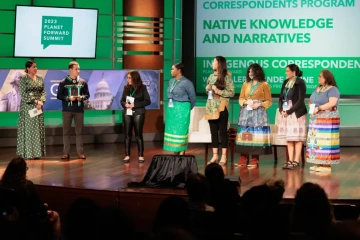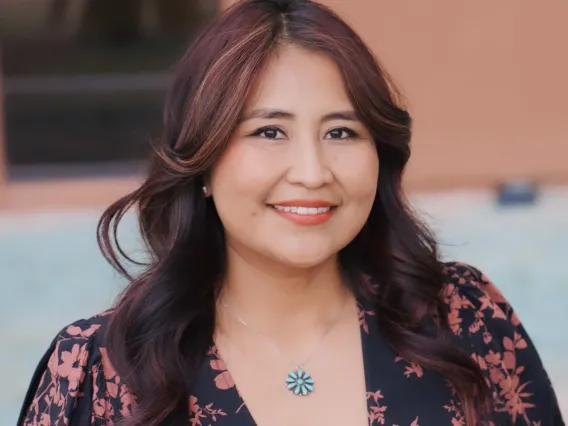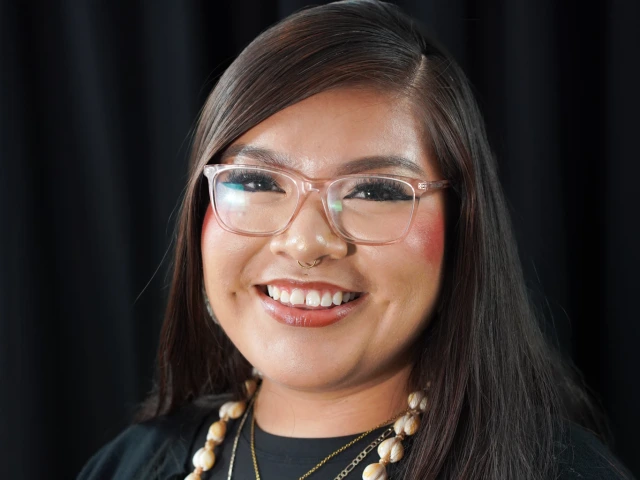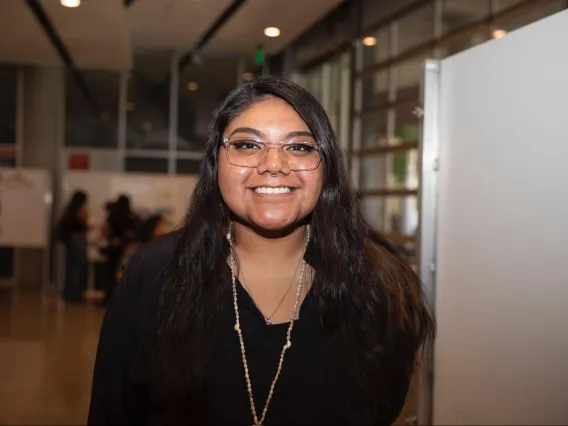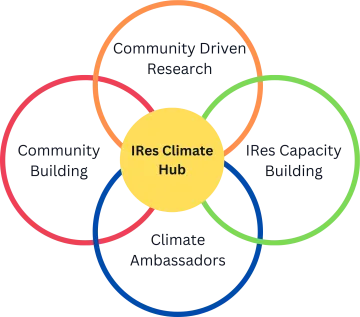
The IRes Climate Hub will bridge four components of the Indigenous Resilience Center.
With the support of the Waverley Street Foundation, the Indigenous Resilience Center began its long-term commitment to become a hub for frontline communities leading on climate change, Indigenous resilience and adaptation. IRes seeks to respect and build upon the resilience knowledge that Indigenous communities can offer to all working on these critical issues while envisioning a world in which Indigenous communities are thriving. This project is firmly grounded in IRes' mission to center Indigenous ways of knowing into co-designed environmental solutions, and train the next generation of community leaders. Foundational to all this work are also values of Respect, Relationship, Reciprocity and Responsibility, as outlined by Dr. Shawn Wilson.
Climate change, pandemics, droughts, and floods are among a list of perturbations disproportionately impacting Indigenous communities and amplifying food, energy and water (FEW) insecurities. Indigenous communities are only 5% of the world’s population yet they maintain 90% of the cultural diversity and 80% of the worlds remaining biodiversity. Indigenous peoples are deeply connected to the sacred spaces on which they have lived sustainably for thousands of years and gained a repository of deep placed based local knowledge.
Tribes have an urgent need to prepare for and respond to climate change impacts and to do so in a way that is holistic and considers cultural and traditional values. There is inconsistency in predicting these impacts because of uncertainty in model projections, lack of community-specific climate and water resources data, and unpredictable interactions among changes, impacts, and factors. Climate adaptation strategies will be most effective if integrated into a broader sustainability agenda rather than as a stand-alone effort. For Native Americans, who have often been left out of discussions, it is also important that adaptation planning be participatory and transparent.
Climate adaptation is directly related to community resilience. Resilience is the ability to maintain desired structure and function of a FEW socio-ecological system under perturbation, such as that associated with climate change or COVID-19 for example. Yet outside of health metrics, FEW resilience frameworks often fail to consider Indigenous perspectives. Existing resilience frameworks aimed to co-manage resources and empower Indigenous people still remain part of an unjust and colonial system and fail to consider political, social and cultural perspectives. Engaging Indigenous perspectives in examining Indigenous resilience may improve, for example, sustainable water resources research and management and facilitate addressing FEW insecurities among Native American communities. FEW technologies can augment adaptive capacity to transform system state to desired structure and function thus increasing resilience, at multiple scales (e.g., household, community and tribal nation).
Since 2023, the IRes Climate Hub has worked to address the unmet needs of Indigenous communities while working to develop capacity through an engagement model with four pillars of strategic engagement and commitment to resilience. The first pillar focuses on community capacity building, and includes Community Environmental Impact Awards for community organizations; the second pillar supports community-driven research; the third pillar entails commitment to IRes' own capacity building, and the fourth pillar invests into student-centered programming. All four components of the engagement model for the Hub work together in a holistic approach to address community resilience in an effort to build capacity, address climate change, and empower community members to become the best advocates for themselves and their respective Nations. For more details, we invite you to review the 2023-2024 Waverley Foundation Report.
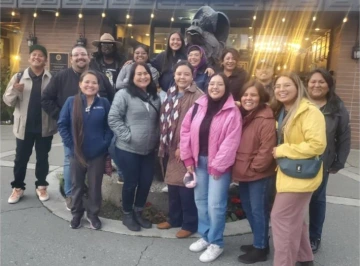
In 2024 and 2025, the IRes Climate Hub issues mini-grants called Community Environmental Impact Awards for community organizations, tribal entities, and non-profit organizations to address climate impacts. Additionally, the Hub has provided grants training, travel, stipends, and training support for community members. Based on the listening sessions and needs outlined by tribal representatives and community members, the Hub has worked to co-convene opportunities for training, community dialogue and capacity building, including the 2024 Southwest Adaptation Form (SWAF), the 2024 U.S Indigenous Data Sovereignty & Governance Summit, and Biennial National Tribal and Indigenous Climate Conference in Anchorage, AK with the Institute for Tribal Environmental Professionals (ITEP) (Photo: IRes and our awardees in Anchorage, AK). With its effort to assist in empowering our community, the Hub has also initiated steps to engage in policy development in various sectors to address the inequities that exist in tribal communities.
Continuing its effort to engage in community-driven research, the Hub allows IRes Core Faculty to continue community driven research with specific tribal nations. Additionally, IRes has developed efforts to implement an official system to create a Faculty Affiliation Process and award faculty with start up funds for pilot research projects in respective communities.
In 2025, IRes is therefore delighted to welcome our new Affiliated Faculty Members: Christina Bell Andrews, Dr. Andrew Curley, Dr. Vicky Karanikola and Dr. Stephanie Russo Carroll.
For more information on the research ares of our Core and Affiliated Faculty, please visit our Directory page.
In August 2024, the work of IRes faculty and staff also resulted in achieving a major milestone in moving forward community driven research between the IRes Climate Hub and the Navajo Nation with signing The Navajo Nation and University of Arizona Memorandum of Agreement (MOA). For a full story, click here.
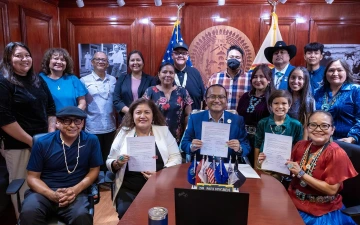
As a key component of our cooperation with the Waverley St. Foundation, IRes has committed resources to build its own capacity to address the needs of Tribal community. Waverley's support has allowed IRes to leverage funding for salary and operation support, and build out our team, including staff, researchers, students, and affiliated faculty. In particular, IRes focused on developing a cohesive unit that brings together expertise and experience in a number of areas. All the team members have either played a direct role in community driven research, or in capacity building for the community. Please visit our Directory for more information on our team members.
Additionally, the Hub has started to develop develop a community toolbox/resource portal that will allow tribes to access data, house programming information, and provide technical assistance.
IRes has utilized funding from the Waverley St. Foundation to support student and community focused programming. The Climate Ambassadors Program serves as a vehicle for IRes to focus its efforts on student-centerted programming while including youth and community members with a particular emphasis on youth involvement.
The overall Climate Ambassadors Program follows two tracks: the Climate Ambassadors and the Iliiaitchik: Indigenous Correspondents Program. Both programs intertwine the Climate Hub's commitment to storytelling, raising awareness of environmental issues in Indigenous communities, and training the next generation of leaders.
Currently in development, the first track, i.e. the Climate Ambassadors Program, will train 12 Indigenous community members trhough an 8-month professional development program that follows the Indigenous Environmental Advocacy Model. Participants, including college students from tribal colleges and universities, and the University of Arizona (all majors) will develop leadership, science, and technical skills, as well as actionable solutions to address environmental challenges. They will join a network of Indigenous activists and thought leaders, and receive a stipend upon a successful completion.
The second track, i.e. IIiiaitchik: Indigenous Correspondents Program supports 10-12 Indigenous students through a year-long professional development, communication skill-building, and community-building program led by Indigenous mentors in fields ranging from environmental journalism and science, to photography and music production. Students with an interest in environmental science-related fields, finding and sharing resilient, innovative solutions, and effective storytelling in media spaces are encouraged to apply.
